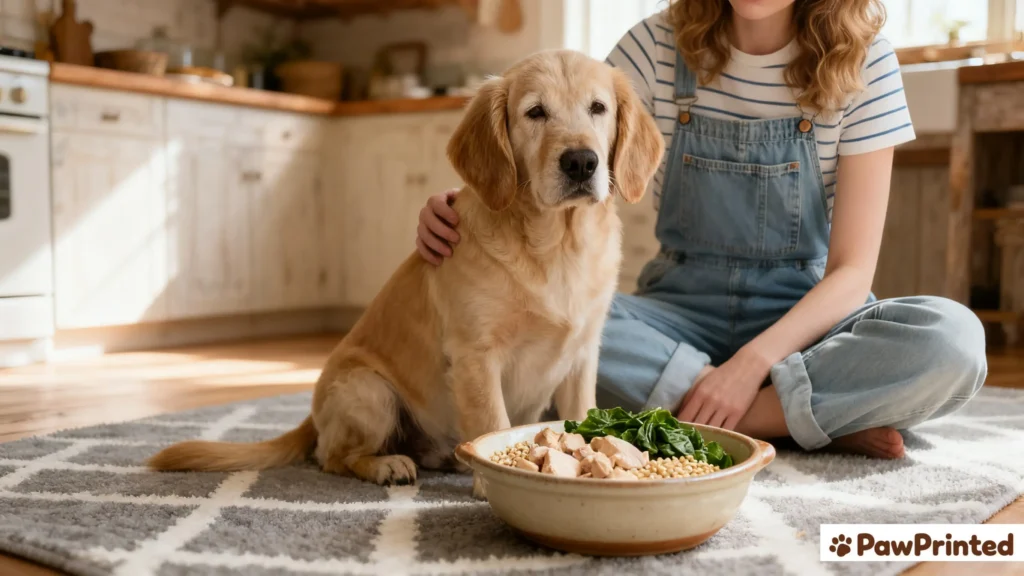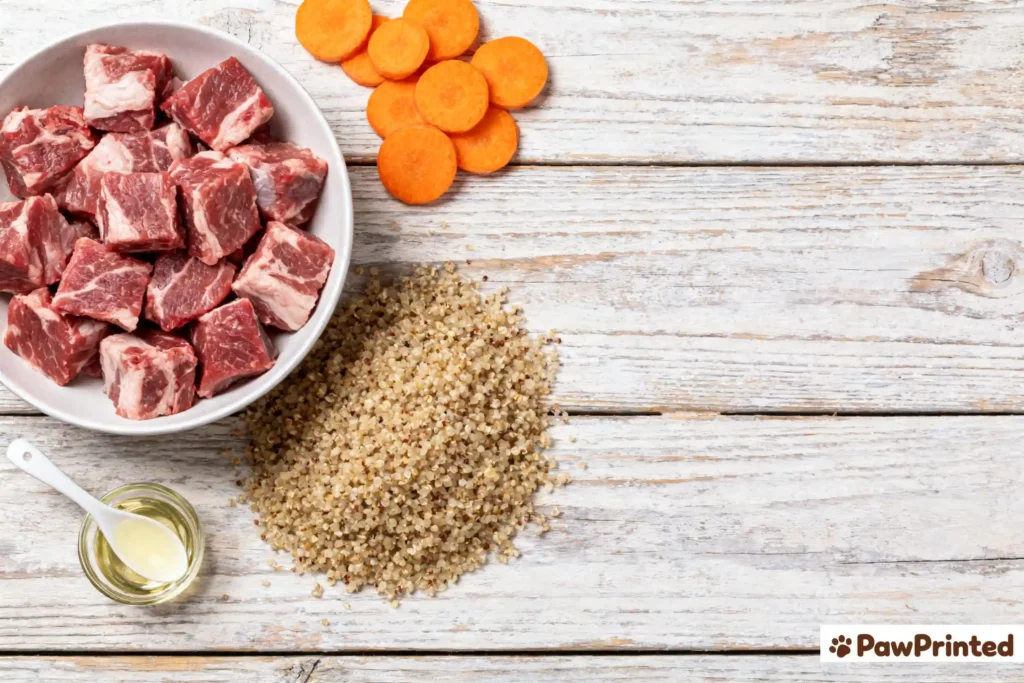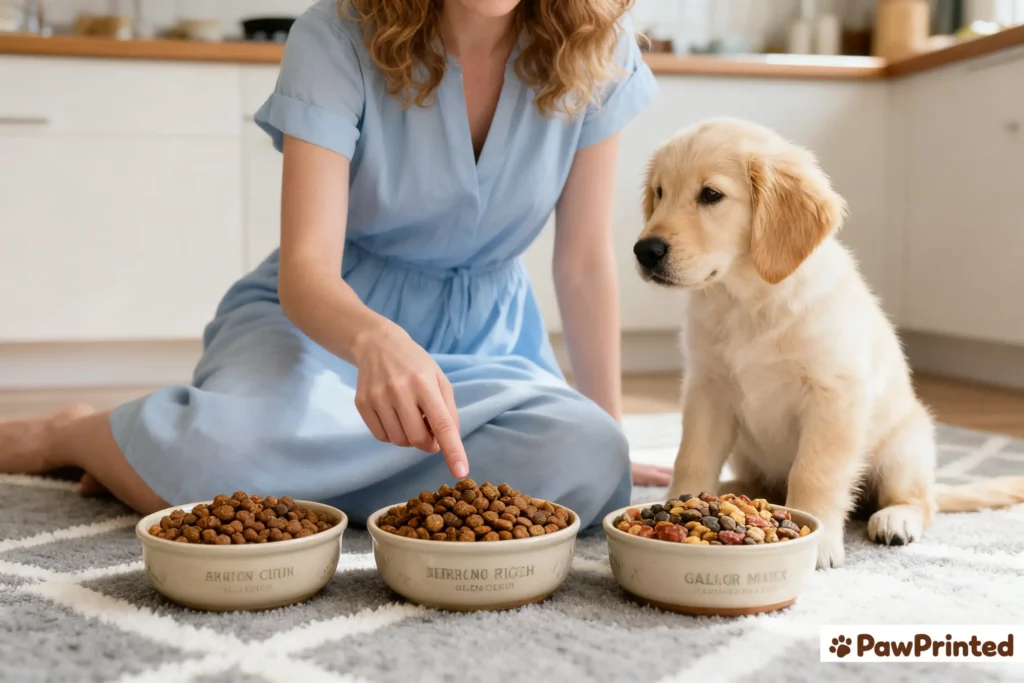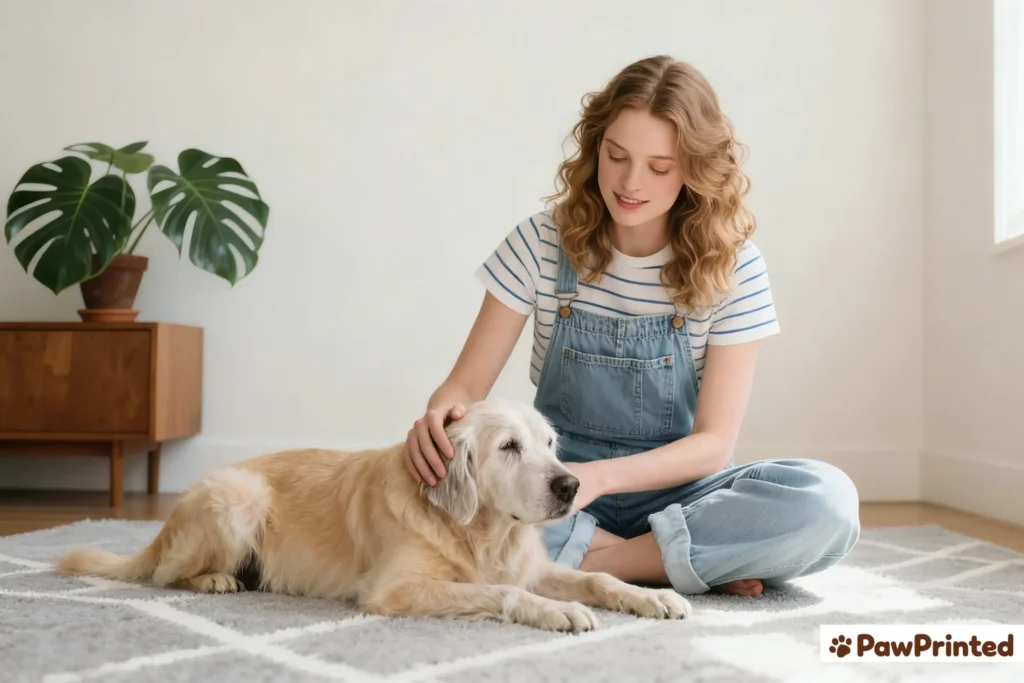When Ethan turned eight, I noticed quiet shifts: longer pauses on walks, deeper evening naps, and a few nights when dinner didn’t sit right. It wasn’t dramatic—just enough to remind me his tummy and joints needed gentler care. I started testing senior-friendly foods with digestible proteins, steady fibers, and joint support. What follows is the routine that brought him back to wagging—nothing flashy, just week-by-week comfort. If your senior prefers softer textures, our wet picks here can help: Best Wet Food for Senior Dogs. For stiffness or slower mornings, these can complement diet: Joint-Support Supplements for Senior Dogs.
Vet-aware, real-world guidance for older pups—fewer tummy surprises, more comfortable days.
Most senior dogs do best on easy-to-digest proteins, balanced fiber, and targeted joint/brain nutrients. Add slow transitions and occasional probiotics, and you’ll smooth out many age-related ups and downs. Here’s what consistently worked for Ethan.

⚠️ Red flags: rapid weight change, persistent vomiting/diarrhea, blood in stool, refusal to eat, or extreme lethargy. See your vet before switching diets—food helps maintenance, not emergencies.
What Worked for Ethan
Our weekday anchor became Hill’s Science Diet Senior Chicken & Barley—gentle and predictable. For a lift, Purina Pro Plan Senior 7+ added antioxidants Ethan seemed to enjoy. Dogs with sensitivities often settled on Blue Buffalo Senior (Basics-style). We also rotated Nutro Natural Choice Senior, Wellness Complete Health Senior, and Royal Canin Senior Aging 8+—each brought something helpful without rocking his stomach.
Why Senior Dogs Need Special Care
Aging slows metabolism and can make digestion more sensitive. That’s why formulas with gentle proteins, steady fiber, and joint support matter. If your senior also has tummy issues, start with our hub on sensitive digestion: Best Dog Food for Sensitive Stomach & Diarrhea. For potential allergens, see Limited Ingredient Dog Food and the Dog Food for Allergies Hub. Probiotics and digestion support are covered here: Dog Supplements for Sensitive Stomach. And always follow a slow changeover: Dog Food Transition Guide.
As dogs age, their nutritional needs change dramatically. Senior pups often struggle with joint stiffness and slower digestion, which makes choosing the right food critical. Veterinary organizations like the American Veterinary Medical Association (AVMA) stress that balanced diets can reduce discomfort and improve quality of life. According to the American Kennel Club (AKC), senior-specific formulas should include joint-supporting nutrients like glucosamine and chondroitin. Research from Cornell University’s College of Veterinary Medicine also highlights the importance of highly digestible proteins to ease the load on aging digestive systems.

Our Simple Feeding Routine
- Morning: gentle dry kibble; add a small probiotic topper (see Probiotics for Dogs).
- Evening: a modest wet portion for hydration and appetite (see Best Wet Food for Senior Dogs).
- Weekly rotation: bring in a limited-ingredient option for variety and tolerance checks (see Limited Ingredient Dog Food).
- Supplements: glucosamine/chondroitin for joints; omega-3s for coat & brain health (see Joint-Support Supplements).
- Water & pacing: fresh water, smaller meals, and slow transitions (see Transition Guide).
Comparison Table
| Option | Why It Helps | Best For |
|---|---|---|
| Hill’s Senior Chicken & Barley | Gentle protein, steady fiber | Everyday staple |
| Purina Pro Plan Senior 7+ | Antioxidants, cognitive support | Energy & focus |
| Blue Buffalo Senior (Basics) | Limited-ingredient profile | Allergy-prone seniors |
| Nutro Natural Choice Senior | Balanced macro profile | General maintenance |
| Wellness Complete Health Senior | Glucosamine & immune support | Active seniors |
| Royal Canin Senior Aging 8+ | Kibble size & texture | Small breeds |

FAQ
Yes—many seniors benefit from a wet-and-dry combination. Wet food boosts hydration and palatability for picky eaters, while dry food helps maintain dental health and stool consistency. A practical routine is wet in the morning, dry at night, adjusting portions to weight and activity. If your dog has a history of digestive upset, introduce wet food gradually and monitor stool quality. For more ideas on gentle textures, see our wet picks for sensitive tummies: Best Wet Dog Food for Sensitive Stomach.
Most owners notice steadier stools, brighter coats, and calmer tummies within 2–4 weeks, provided the transition is slow. Start with 25% new food mixed into 75% current food, then increase every few days over 7–10 days. Rushing can trigger gas, soft stools, or refusal to eat. Track weight, appetite, and energy weekly. If symptoms persist, revert a step and speak with your vet. For pacing tips, see the Dog Food Transition Guide.
No. Senior formulas are designed for maintenance, not growth. Puppies require higher protein, calories, and DHA to support rapid development of the brain, muscles, and bones. Feeding senior diets too early risks undernutrition and poor growth. Keep puppies on age-appropriate food until adulthood based on breed size, then shift to adult and later senior diets as recommended. Explore our age-appropriate picks here: Puppy Dog Food Hub.
Often, yes—when chosen for a dog’s specific needs. Probiotics can stabilize digestion; glucosamine and chondroitin support aging joints; and omega-3s (EPA/DHA) help brain, heart, and coat. Introduce one product at a time and watch for tolerance. Always discuss with your vet if your dog has chronic disease or takes medication. Starter picks for gentle, gut-friendly support: Dog Supplements for Sensitive Stomach.
Choose highly digestible proteins first (chicken, turkey, salmon, lamb) and match them to your dog’s history. If your senior has suspected allergies, a limited-ingredient formula with a single protein can reduce guesswork; fish-based options also deliver omega-3s that support joints and cognition. Watch stool quality and gassiness as early feedback. Hubs to start with: Limited Ingredient Dog Food and Salmon Dog Food.
Most seniors do well with two smaller meals daily; sensitive tummies may prefer three lighter portions to reduce digestive load. Keep feeding times consistent to stabilize appetite and stool patterns. Adjust total calories to weight and activity, and recheck body condition monthly. If you’re transitioning foods or adding wet portions, change one variable at a time so you can read your dog’s response clearly. For pacing and portion ideas, revisit the Transition Guide.
If you don’t want to cook daily, check our dry food picks — those were Ethan’s steady backups on busy weeks.

Wrapping It Up
Senior care is mostly small, kind choices: gentler proteins, steadier fibers, thoughtful rotation, and patience. Ethan reminded me that comfort grows slowly—and it’s worth it. If you’re unsure where to start, begin with a gentle wet option, then settle into a reliable dry pick that keeps stools calm and energy even. I’d love to hear what’s worked for your pup in the comments.
Follow PawPrinted On Pinterest
Want more gentle senior routines, joint-friendly picks, and digestion tips? Follow us on Pinterest and save your favorite ideas — we share fresh inspo every week!

